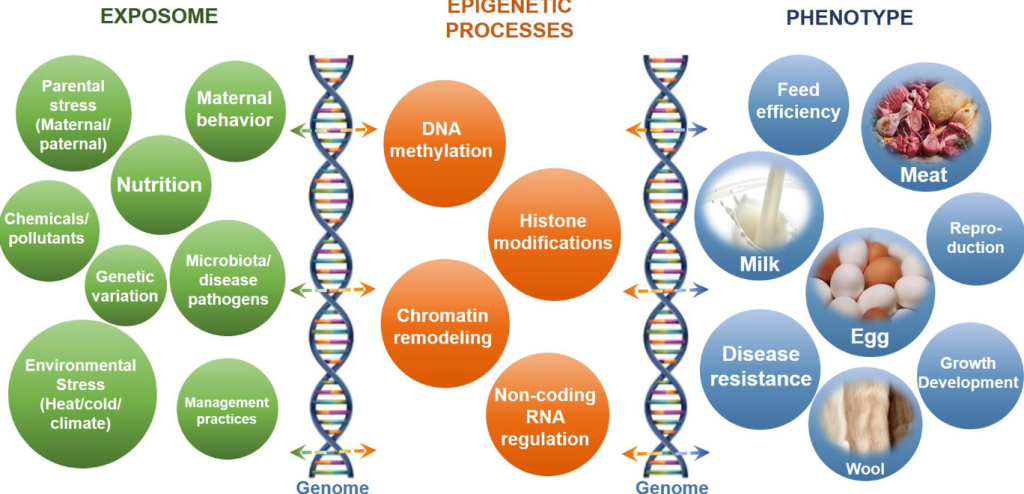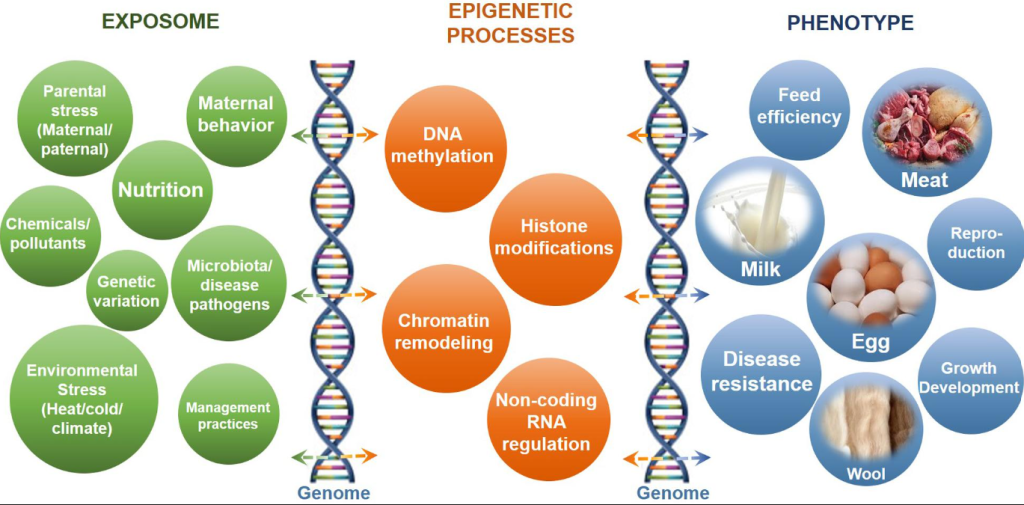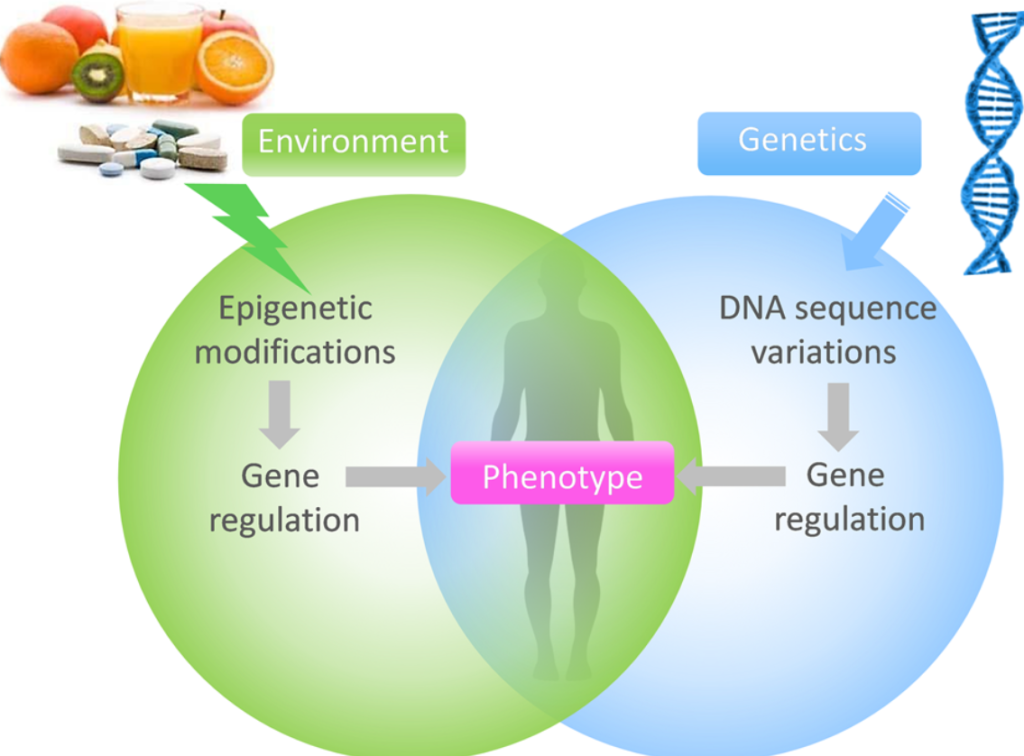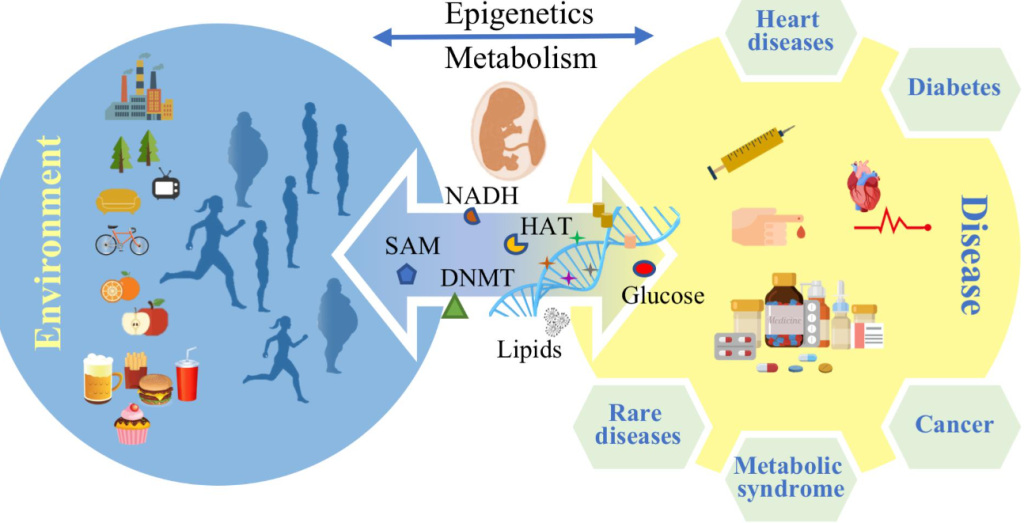
What is Epigenetic?
Epigenetics is the study of how changes in gene function that do not involve changes in the underlying DNA sequence can be passed down from parents to offspring. These changes are often influenced by environmental factors, such as diet, exercise, and stress.
Epigenetic changes can affect gene expression in a number of ways. For example, they can silence genes, making them less likely to be expressed, or they can activate genes, making them more likely to be expressed. Epigenetic changes can also affect the way that genes are regulated, which can lead to changes in gene expression.
Epigenetic changes are thought to play a role in a wide range of human diseases, including cancer, Alzheimer’s disease, and Parkinson’s disease. They are also thought to play a role in aging and development.

Here are some examples of epigenetics:
- DNA methylation: DNA methylation is a process in which methyl groups are added to DNA. This can silence genes by making them less accessible to transcription factors, which are proteins that bind to DNA and regulate gene expression.
- Histone modifications: Histones are proteins that DNA is wrapped around. Histone modifications can change the way that DNA is packaged, which can affect gene expression.
- Non-coding RNAs: Non-coding RNAs are molecules that are transcribed from DNA but are not translated into proteins. Non-coding RNAs can regulate gene expression by binding to DNA or to other RNAs.
Epigenetic research is a rapidly growing field, and scientists are learning more about how epigenetics works and its role in human health and disease. Epigenetic changes may offer new ways to diagnose and treat diseases.

One example of epigenetics is the role of early childhood experiences in shaping brain development and mental health. Children who experience trauma or neglect early in life are more likely to have epigenetic changes that lead to increased inflammation and decreased stress resilience. These changes can increase the risk of developing mental health problems such as depression and anxiety later in life.
Another example of epigenetics is the role of diet in cancer prevention. Eating a healthy diet that is rich in fruits, vegetables, and whole grains can help to reduce the risk of developing cancer by promoting epigenetic changes that silence cancer-promoting genes.
Epigenetics is a complex and fascinating field of research with the potential to revolutionize our understanding of human health and disease.
Why Epigenetic reasearch is being done?

Epigenetics research is gaining significant attention due to its profound implications for understanding gene expression, health, and disease. Epigenetics refers to changes in gene activity that do not involve alterations to the underlying DNA sequence but still influence how genes are turned on or off.
Here are several reasons why epigenetic research is being conducted:
- Understanding Development and Differentiation: Epigenetic modifications play a crucial role in the development and differentiation of cells in multicellular organisms. Researching these processes helps us understand how the same genetic material can result in a multitude of cell types, from skin cells to neurons.
- Disease Mechanisms: Aberrant epigenetic modifications can contribute to various diseases, including cancer, neurodegenerative disorders, and autoimmune diseases. Understanding these mechanisms can pave the way for new therapeutic interventions.
- Environmental Interactions: Epigenetic modifications can be influenced by environmental factors, such as diet, stress, and toxins. This research can explain how external factors at different life stages can impact health outcomes.
- Transgenerational Effects: There’s growing evidence suggesting that epigenetic changes might be passed from one generation to the next, influencing health outcomes of future generations. This is of particular interest in understanding how experiences of ancestors might impact current generations.
- Therapeutic Potential: Epigenetic modifications are reversible. Researching drugs and interventions that can target and modify epigenetic processes holds promise for treating various diseases, particularly certain types of cancer.
- Aging Research: Epigenetic changes accumulate over time and play a role in aging and age-related diseases. Understanding these changes can give insights into extending lifespan and improving health during aging.
- Behavior and Neurological Research: Epigenetics plays a role in brain function and can influence behavior and memory. This is of particular interest in conditions like depression, addiction, and other neurological and psychiatric disorders.
- Nutrition and Lifestyle: Understanding how diet and lifestyle factors influence epigenetic modifications can lead to recommendations for healthier living and potentially even personalized nutrition.
- Filling Knowledge Gaps: The genome-wide association studies (GWAS) have identified many genetic locations associated with diseases, but many of these locations don’t seem to affect protein function. Epigenetics might help explain these findings.
What are the Benefits of Epigenetic Study?
Epigenetic studies have the potential to revolutionize our understanding of human health and disease. Here are some of the potential benefits of epigenetic research:
- Improved diagnosis of diseases: Epigenetic changes can be used to develop new and more accurate diagnostic tests for a variety of diseases, including cancer, Alzheimer’s disease, and Parkinson’s disease.
- New treatments for diseases: Epigenetic changes may offer new ways to treat diseases. For example, scientists are developing drugs that can target and reverse epigenetic changes associated with cancer and other diseases.
- Personalized medicine: Epigenetic information can be used to develop personalized treatment plans for patients. For example, doctors could use epigenetic information to identify the best drugs for a patient’s particular type of cancer.
- Improved understanding of development and aging: Epigenetic changes play a role in development and aging. By studying epigenetic changes, scientists can learn more about how the body develops and how we age.
- Improved mental health: Epigenetic changes are thought to play a role in mental health problems such as depression and anxiety. By studying epigenetic changes, scientists may be able to develop new and more effective treatments for mental health problems.
Epigenetic research is a rapidly growing field, and scientists are making new discoveries all the time. As we learn more about epigenetics, we will be able to develop new and better ways to diagnose, treat, and prevent diseases.
How Epigenetic is helpful in Anti Aging?
Epigenetics has become an increasingly prominent area of study in the field of anti-aging due to its potential to influence the aging process. Here’s how epigenetics is relevant to anti-aging:
- Aging Epigenome: As we age, there are specific, predictable changes in the epigenome, particularly in DNA methylation patterns. Some researchers describe these alterations as the “epigenetic clock.” By understanding these changes, scientists hope to pinpoint processes that could be targeted to slow down or reverse age-related epigenetic changes.
- Cellular Senescence and Epigenetics: Cellular senescence refers to a state in which cells lose their ability to divide and function. These senescent cells can contribute to aging and age-related diseases. Epigenetic alterations play a crucial role in the induction of cellular senescence, and targeting these epigenetic changes might delay senescence or rejuvenate senescent cells.
- Reversing Epigenetic Marks: Since epigenetic marks are, by nature, reversible, researchers believe that it may be possible to “reset” the epigenome, thereby rejuvenating cells. Techniques involving the use of specific factors (like the Yamanaka factors) have shown potential in reverting aged cells to a more youthful state, both in their function and their epigenetic markers.
- Caloric Restriction and Epigenetics: Caloric restriction, which involves reducing calorie intake without malnutrition, has been known to extend lifespan in various organisms. Some of these beneficial effects are believed to be mediated by epigenetic modifications, offering insights into how diet can influence the aging process at the epigenetic level.
- Epigenetics and Age-Related Diseases: Many diseases associated with aging, including Alzheimer’s, certain types of cancer, and cardiovascular diseases, have epigenetic components. By understanding and potentially reversing these epigenetic changes, we could combat age-related diseases more effectively.
- Therapeutic Compounds: Numerous compounds, like histone deacetylase inhibitors (HDAC inhibitors), influence the epigenome and have shown promise in treating age-related conditions and potentially slowing the aging process.
- Nutrition and Epigenetic Aging: Certain nutrients and bioactive food components can influence epigenetic mechanisms. Understanding how diet interacts with the epigenome can lead to nutritional strategies to combat aging.
- Environmental Factors: Our environment, including exposure to toxins, stress, exercise, and more, can influence epigenetic aging. Knowledge in this area can help in devising strategies for a healthier lifestyle that slows down aging.